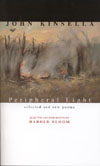 Peripheral Light: Selected and New Poems, Selected and Introduced by Harold Bloom by John Kinsella
Peripheral Light: Selected and New Poems, Selected and Introduced by Harold Bloom by John Kinsella
Fremantle Arts Centre Press, 2003
With his appearances on ABC TV's 'Critical Mass' program John Kinsella is becoming something of a public intellectual. His severe demeanour and combative stance suggest an aggressive priest, Savaranola maybe. The poems in this collection do not dispel this impression, there is a savagery in them, of tone, image and spirit.
This savagery appears to be born of the harshness of the W A Wheatlands which are Kinsella's 'soul's country', a landscape of which his psyche is possessed so that poems which allude to say Cambridgeshire or Ohio seem merely foils for or momentary respites from the much more vivid evocations and meditations on the horrors of life on the Wheatlands. The high jinks of college students can hardly compare with “the orange, gold and emerald hearts of parrots” littering a road or an auger running crazy with the blood of an arm it has severed.
Kinsella seems unlikely to ever escape this more than landscape, desiccated, sterilised and so preserved by the rising, spreading salt which is gradually overcoming the floodings of blood (often figured as sap) which is its antithesis. The triumph of salination runs through these poems, providing a macabre image of the creative spirit being chemically transformed into a friable simulacrum –
… but the verse
as descriptive as an idle plough,
or a mat of hay spread over the ooze
of a dead sheep that is the floor
of the soak (blood black beneath the skin,
bones honeycombed), crystallised with salt.(from 'Wheatbelt Gothic or Discovering a Wyeth').
This possession is far more important to his poetry than his academic associations, though Kinsella is an intellectual poet, increasingly so, I would guess, as time has gone by. Harold Bloom, in the larded Introduction to his selection, contends that Kinsella is a poet who has “unfolded” rather than “developed”. The poems are not dated so it is difficult to explore that contention on the basis of this book (Kinsella has had sixteen others published as well as two books of fiction, a play and an autobiography) though they do seem to be presented in a roughly chronological order and it is true that Kinsella's eclogues can be discerned as the basis of his far more ambitious poems.
An attraction to academic post modernism does seem to have unfolded (whatever) from what look like explorative/parodic devices –
i. Finite-state
The 'i' takes in what is said –
yes, it is easily led
across the floors of discourse…
ii. Phrase-structure
{[((analyz)ing)] [the ((constituent)s)]}
we examine(?) the wool of sheep(from 'Skeleton weed/generative grammar')
to a suaver allusiveness and a self-interrogation which usually avoids awkwardness –
… Snap out of it, return
to the room – ideas that sing should not be fused
with words if sanity is to be preserved. Instead, paint pictures
and distil a moral truth from this. Poetry will not tolerate
a mix of concept and the visual, it fools neither
forest creature nor human.(from 'Sculpting a Poem from the Landscape's Painting')
Kinsella, ignoring his own caveat, seems to be mixing concept and the visual in order to advance his art. This also seems to be what Bloom had in mind when he wrote “We are poised before the onset of what I prophesy will be a major art”. Vatic statements about a poet's 'unfolding' (or such) are ominous.
Kinsella is at best a lyricist, albeit one of harshness, his evocations of the Wheatlands' grim pastoral seem to be his raison d’être. It is a landscape populated by birds, sheep, mechanical devices and ghosts. He is not afraid to call it 'Gothic'. It is, despite activity which seems to engender nothing but despair and mutilation, a landscape surreal in its lack of people. This activity is at a sci fi/horror remove from people, a principle locked in mortal combat with its weaker opponent, nature.
It is a world of masculinity predicated on the bitterness of hopeless struggle. Its consummation can only be Robocophood. Kinsella does entertain himself with some ambivalences – there is a girl apprentice being given a hard time, Hockney's Doll Boy goes to a CWA musical to be rejected and more astonishingly Andy Warhol turns up on the Wheatlands. Its horrors impel him to tinfoil his room –
he asks one of us but we're
getting ready for seeding and can't spare a moment.
Dare one hope seeding is a joke?
The measures of Kinsella's verse are very free, flattening to prose at times but he is completely secure in their handling; his ear is very good.
Kinsella is one of the few Australian poets to have any international currency. Though his work is strikingly good the fact that it is immersed in bizarre Outbackerie, celebrates a doomed machismo ethos and consequently reveals an extraordinarily narrrow range of human sympathies might make his success a matter for equivocal congraulations at home.
Ian MacNeill has contributed to Cordite before. The eponymous poem in his TV Tricks and other poems was about a transvestite prostitute.









